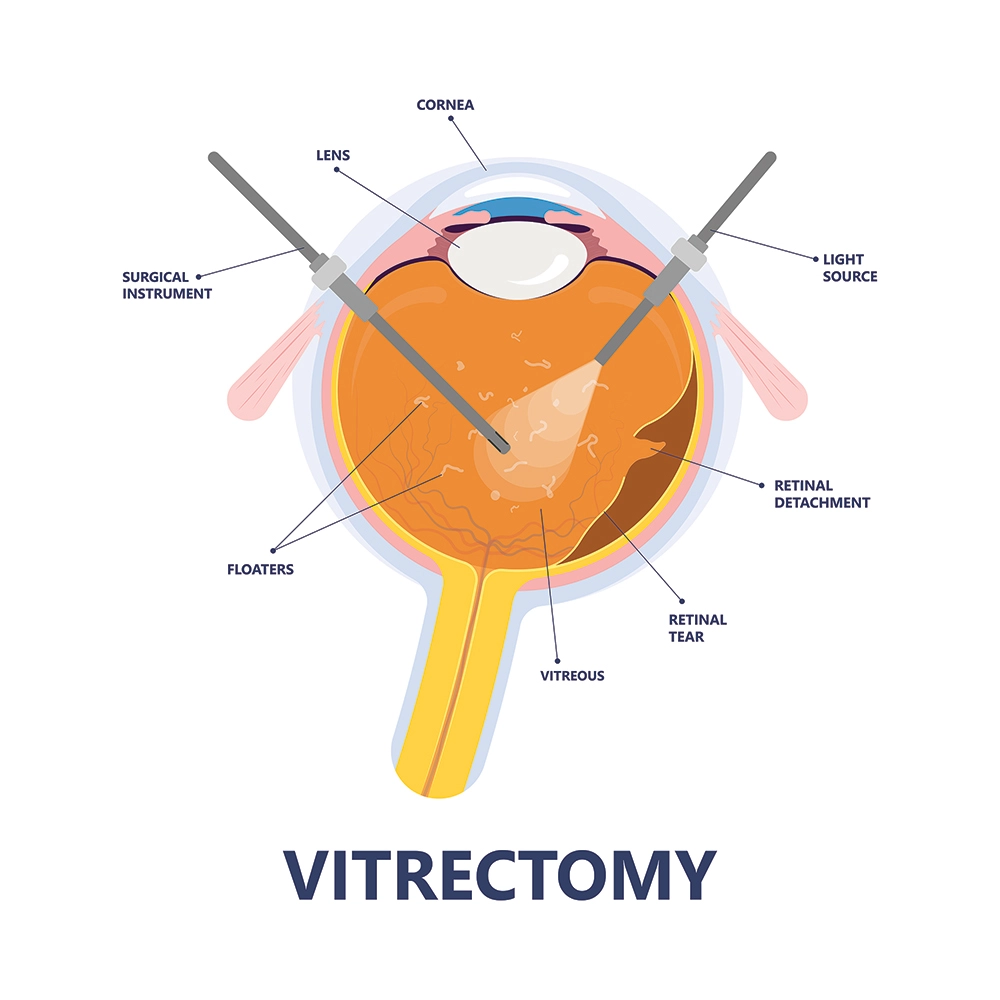The highly experienced retina physicians at Retina Specialty Institute provide specialized, high-quality eye care, including vitrectomy surgery, in the Gulf Coast of Alabama, Mississippi, and Florida.

What Is a Vitrectomy?
Vitrectomy is a surgical procedure that involves removing the vitreous gel from the eye. The vitreous is a clear, gel-like substance that fills the space between the lens and the retina at the back of the eye. The primary purpose of vitrectomy is to access the retina for treatment of various eye conditions.

What Conditions are Treated with Vitrectomy?
Vitrectomy surgery can be used to treat a variety of eye conditions, including:
- Retinal Detachment: When the retina peels away from its underlying layer of support tissue.
- Diabetic Retinopathy: Damage to the retina caused by complications of diabetes, which can lead to blindness if untreated.
- Macular Hole: A small break in the macula, which is the part of the retina responsible for sharp, central vision.
- Vitreous Hemorrhage: Bleeding within the eye, which can obscure vision.
- Epiretinal Membrane: A thin layer of tissue that can form on the surface of the retina, causing vision distortion.
- Severe eye injuries or infections: Conditions such as endophthalmitis, which require immediate treatment
How Can Vitrectomy Improve My Vision?
Vitrectomy can significantly improve vision, particularly when the surgery is performed to treat conditions like macular holes, retinal detachment, or diabetic retinopathy. By removing the vitreous gel and repairing the retina, many patients experience clearer, more stable vision. However, the extent of vision improvement can vary depending on the specific condition being treated and the overall health of the eye.

What Should I Expect with Vitrectomy Surgery?
Preparing for Surgery
One of our vitreoretinal surgeons will examine your eyes and discuss your treatment options to determine if vitrectomy is the best choice for you. Once your procedure is scheduled, you will receive preoperative instructions, which may include adjusting certain medications. You should plan for someone to drive you to and from your surgery.
Vitrectomy Surgery:
Vitrectomy surgery is typically performed under local anesthesia, although general anesthesia may be used in some cases. The procedure usually takes one to two hours. During the surgery, your surgeon makes small incisions in the eye and uses specialized instruments to remove the vitreous gel. Depending on the condition being treated, your surgeon may also perform additional procedures, such as laser treatment or the placement of a gas bubble to help reattach the retina.
Recovery After Vitrectomy
Recovery after vitrectomy surgery involves several key steps:
- Postoperative Care: Follow your surgeon’s instructions closely, including using any prescribed eye drops and medications.
- Activity Restrictions: Avoid heavy lifting, bending over, and strenuous activities during the initial recovery period.
- Positioning: In some cases, you may need to maintain a specific head position to help with the healing process, especially if a gas bubble was used during surgery.
- Follow-Up Visits: Attend all scheduled follow-up appointments to monitor the healing process and address any complications.
Frequently Asked Questions About Vitrectomy Surgery
How long does it take to recover from vitrectomy surgery?
Full recovery can take several weeks to months, depending on the specific condition treated and individual healing rates.
Will I need to wear an eye patch after surgery?
Yes, an eye patch is usually worn for a day or two following the surgery to protect the eye.
What Are the Risks of Vitrectomy Surgery?
As with any surgery, there are risks, including infection, bleeding, and increased intraocular pressure. Your surgeon will discuss these risks with you in detail.
How soon will I notice an improvement in my vision?
Improvement in vision can vary; some patients notice changes within a few weeks, while for others, it may take several months.

Contact Retina Specialty Institute
At Retina Specialty Institute, our practice is dedicated to the treatment of all forms of retinal diseases and disorders. Our experts have deep experience in the diagnosis and management of inherited retinal diseases.
The doctors at Retina Specialty Institute have either authored or reviewed and approved this content.
Page Updated:







